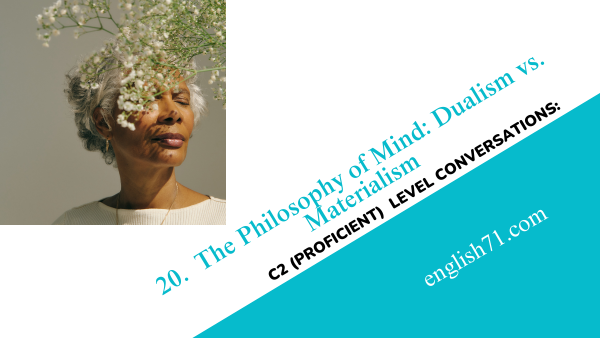C2 (Proficient) level Conversations: (20) The Philosophy of Mind: Dualism vs. Materialism

Ranbir: Hey Sanna, have you ever pondered over the nature of the mind and consciousness?
Sanna: Absolutely, Ranbir! It’s such a fascinating topic. Do you lean towards any particular perspective?
Ranbir: Well, I find myself drawn to dualism. I believe that the mind and body are separate entities. What about you?
Sanna: Interesting! I’m more inclined towards materialism. I think all mental processes can be explained by physical phenomena.
Ranbir: That’s an intriguing viewpoint. But how do you account for phenomena like near-death experiences or consciousness beyond the physical body?
Sanna: While those experiences are compelling, I think they can be understood through neurological mechanisms. Our brains are incredibly complex, and we’re still unraveling many mysteries about consciousness.
Ranbir: Fair point. But what about the subjective nature of consciousness? It feels like more than just neurons firing in the brain.
Sanna: I agree that consciousness is subjective, but that doesn’t necessarily mean it’s separate from the physical. Our perception of reality is influenced by countless factors, including our brain’s processing of sensory information.
Ranbir: True, but I can’t shake the feeling that there’s something inherently non-physical about consciousness. It’s like there’s a part of us that transcends the material world.
Sanna: I understand where you’re coming from, but I believe we can still explore consciousness within the framework of materialism. Advances in neuroscience and psychology are shedding new light on the complexities of the mind.
Ranbir: You make a compelling argument, Sanna. Perhaps there’s more overlap between dualism and materialism than we realize.
Sanna: Absolutely, Ranbir. It’s a complex topic with no easy answers, but I think our dialogue highlights the importance of approaching it with an open mind and a willingness to explore different perspectives.



Summary:
In their profound dialogue, Ranbir and Sanna delve into the philosophical debate between dualism and materialism concerning the nature of the mind. Ranbir advocates for dualism, positing that the mind and body are distinct entities, with consciousness existing independently of physical matter. He supports his argument with examples of near-death experiences and consciousness beyond physical constraints. Conversely, Sanna defends materialism, asserting that all mental processes can be explained by physical phenomena in the brain. She presents neurological evidence and insights from cognitive science to support her viewpoint. Despite their differing perspectives, Ranbir and Sanna engage in a respectful and intellectually stimulating exchange, highlighting the complexity of understanding consciousness and the mind.

